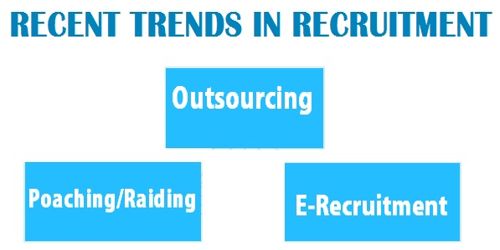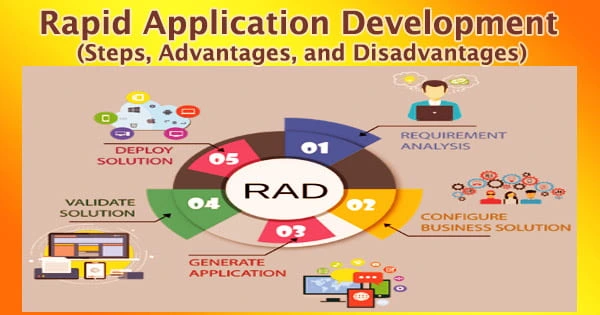Recent Trends in Recruitment
The following trends are being seen in recruitment:
Outsourcing
The HR processes are being outsourced from more than a decade now. A company may draw required personnel from outsourcing firms. The outsourcing firms help the organization by the initial screening of the candidates according to the needs of the organization and creating a suitable pool of talent for the final selection by the organization. Outsourcing firms develop their human resource pool by employing people for them and make available personnel to various companies as per their needs. In turn, the outsourcing firms or the intermediaries charge the organizations for their services. Advantages of outsourcing are:
- Company need not plan for human resources much in advance.
- Value creation, operational flexibility and competitive advantage
- turning the management’s focus to strategic level processes of HRM
- Company is free from salary negotiations, weeding the unsuitable resumes/candidates.
- Company can save a lot of its resources and time
Poaching/Raiding
“Buying talent” is the latest mantra being followed by the organizations today. Poaching means employing a competent and experienced person already working with another reputed company in the same or different industry; the organization might be a competitor in the industry. A company can attract talent from another firm by offering attractive pay packages and other terms and conditions, better than the current employer of the candidate. But it is seen as an unethical practice and not openly talked about. Indian software and the retail sector are the sectors facing the most severe brunt of poaching today. It has become a challenge for human resource managers to face and tackle poaching, as it weakens the competitive strength of the firm.
E-Recruitment
Many big organizations use Internet as a source of recruitment. E- Recruitment is the use of technology to assist the recruitment process. They advertise job vacancies through worldwide web. The job seekers send their applications or curriculum vitae i.e. CV through e mail using the Internet. Alternatively job seekers place their CV’s in worldwide web, which can be drawn by prospective employees depending upon their requirements.
Advantages of recruitment are:
- Low cost.
- No intermediaries
- Reduction in time for recruitment.
- Recruitment of right type of people.
- Efficiency of recruitment process.
Recruitment Management System
Recruitment management system is the comprehensive tool to manage the entire recruitment processes of an organization. It is one of the technological tools facilitated by the information management systems to the HR of organizations. Just like performance management, payroll and other systems, Recruitment management system helps to contour the recruitment processes and effectively managing the ROI on recruitment.
The features, functions and major benefits of the recruitment management system are explained below:
- Structure and systematically organize the entire recruitment processes.
- Recruitment management system facilitates faster, unbiased, accurate and reliable processing of applications from various applications.
- Helps to reduce the time-per-hire and cost-per-hire.
- Recruitment management system helps to incorporate and integrate the various links like the application system on the official website of the company, the unsolicited applications, outsourcing recruitment, the final decision making to the main recruitment process.
- Recruitment management system maintains an automated active database of the applicants facilitating the talent management and increasing the efficiency of the recruitment processes.
- Recruitment management system provides and a flexible, automated and interactive interface between the online application system, the recruitment department of the company and the job seeker.
- Offers tolls and support to enhance productivity, solutions and optimizing the recruitment processes to ensure improved ROI.
- Recruitment management system helps to communicate and create healthy relationships with the candidates through the entire recruitment process.
The Recruitment Management System (RMS) is an innovative information system tool which helps to sane the time and costs of the recruiters and improving the recruitment processes.
Recruitment Strategies
Recruitment is of the most crucial roles of the human resource professionals. The level of performance of an organization depends on the effectiveness of its recruitment function. Organizations have developed and follow recruitment strategies to hire the best talent for their organization and to utilize their resources optimally. A successful recruitment strategy should be well planned and practical to attract more and good talent to apply in the organization.
For formulating an effective and successful recruitment strategy, the strategy should cover the following elements:
Identifying and prioritizing jobs
Requirements keep arising at various levels in every organization; it is almost a never-ending process. It is impossible to fill all the positions immediately. Therefore, there is a need to identify the positions requiring immediate attention and action. To maintain the quality of the recruitment activities, it is useful to prioritize the vacancies whether to focus on all vacancies equally or focusing on key jobs first.
Candidates to target:
The recruitment process can be effective only if the organization completely understands the requirements of the type of candidates that are required and will be beneficial for the organization. This covers the following parameters as well:
- Performance level required: Different strategies are required for focusing on hiring high performers and average performers.
- Experience level required: the strategy should be clear as to what is the experience level required by the organization. The candidate’s experience can range from being a fresher to experienced senior professionals.
- Category of the candidate: the strategy should clearly define the target candidate. He/she can be from the same industry, different industry, unemployed, top performers of the industry etc.
Forms of Recruitment
The organizations differ in terms of their size, business, processes and practices. A few decisions by the recruitment professionals can affect the productivity and efficiency of the organization. Organizations adopt different forms of recruitment practices according to the specific needs of the organization. The organizations can choose from the centralized or decentralized forms of recruitment, explained below:
Centralized Recruitment
The recruitment practices of an organization are centralized when the HR recruitment department at the head office performs all functions of recruitment. Recruitment decisions for all the business verticals and departments of an organization are carried out by the one central HR (or recruitment) department. Centralized from of recruitment is commonly seen in government organizations.
Benefits of the centralized form of recruitment are:
- Reduces administration costs
- Better utilization of specialists
- Uniformity in recruitment
- Interchangeability of staff
- Reduces favoritism
Every department sends requisitions for recruitment to their central office
Decentralized Recruitment
Decentralized recruitment practices are most commonly seen in the case of conglomerates operating in different and diverse business areas. With diverse and geographically spread business areas and offices, it becomes important to understand the needs of each department and frame the recruitment policies and procedures accordingly. Each department carries out its own recruitment. Choice between the two will depend upon management philosophy and needs of particular organization. In some cases combination of both is used. Lower level staffs as well as top level executives are recruited in a decentralized manner.
Information Source:
















